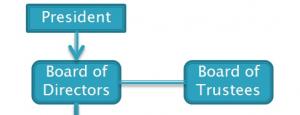Considering this is the first YPAB Newsletter, I thought I'd educate some young professionals and students about how AIChE works. The hope is that you'll discover which areas of AIChE seem most interesting to you, either personally or professionally. I've been around a bit as a volunteer of AIChE and I can tell you from experience that it can be very intimidating, just due to its immense scope and size. The institute covers all sorts of industries as well as all sorts of different internal activities.

However, once one figures out the structure and how the different parts interact (and sometimes don't interact) with each other, I've found it very easy to navigate. So let's get to it, shall we?
The Boards and President
The institute is essentially run by AIChE's board of directors and by its president. Well, to be honest, the AIChE president doesn't have much authority since the president's term is usually only one year. Typically, the AIChE president will try to enact programs or plans to help improve the institute as a whole, whether that be in the areas of increasing membership or having AIChE focus on technical initiatives like the Energy Initiative enacted by Dale Keairns.

It's the board of directors who really runs the show for AIChE. They are a 12-member group that decides how the institute's funds are spent and approves which programs are run by which committees. There is also the board of trustees that operates somewhat independently of the board of directors and president. The purpose of the board of trustees is to seek out corporate donations and government grants that can assist in supporting programs that will enrich the membership of AIChE. A few programs that have benefited from the board of trustees efforts are the Scale-Up Program, which made national membership for students free, and the Opening Doors program, which supports the Young Professional House Parties as well as the Lunch and Learn Webinars. You will find that most of the people who are a part of these boards are high-level and well-connected engineers. This is where you'll find company presidents or well-known researchers or professors who may have written college textbooks at one time or another. This is a good group to get in with but, with the exception of the board of trustees, you must be elected to these positions.
The Operating Councils
Though the board of directors has the ultimate authority over the programs run by the committees, it does not govern over every detail that makes up AIChE. Considering there are 100+ local sections, 110+ student chapters, approximately 20 divisions, and 30 committees that deal with all sorts of matters, the board would have a tough time trying to keep track of everything. Those groups are the responsibility of three operating councils. Each operating council oversees one specific area of the institute and they are responsible for the budget and programs run by the groups they oversee. Those operating councils, in turn, communicate with the board of directors on budgetary needs and progress on certain initiatives laid out by the board.
Career and Education Operating Council (CEOC)
The Career and Education Operating Council probably has the greatest influence over what happens to you and me as members of AIChE. All of the local sections and student chapters are under the charge of this operating council, which means it represents most, if not all, members of AIChE.
Chemical Engineering Technology Operating Council (CTOC)
This operating council is the meat and potatoes of the Institute. CTOC oversees the areas of research and new technologies associated with chemical engineering. In addition, they are responsible for all programming for the national meetings as well as for CEP. All technical divisions report to this operating council, and it's those divisions who are counted on to provide content for the national meetings. This is where AIChE derives its technical relevance.
Societal Impact Operating Council (SIOC)
This is perhaps the operating council that has garnered the least amount of attention from the institute in the past few years but it probably has the greatest influence over the institute's image to the general public. SIOC is responsible for volunteer programs that are run to help benefit society as a whole through the particular skills of chemical engineers. SIOC also deals with the social needs of chemical engineers in the areas of gender and minority equality. I sure hope you've enjoyed this mini-tour of AIChE. Like I said, it's a big organization but don't let that intimidate you. Its size allows for people with a great variety of backgrounds and interest to find their place and pursue their desires within the realm of chemical engineering. If any of you want to make a difference in our profession, AIChE is the perfect place to do it. For more information about SIOC, see the latest YPAB Newsletter Article titled "What is SIOC?" and look for more information about AIChE's other operating councils, divisions, and committees in future editions. For a more detailed look at all of the operating councils see the ChEnected article: "After School Special- A Road Map to AIChE"

